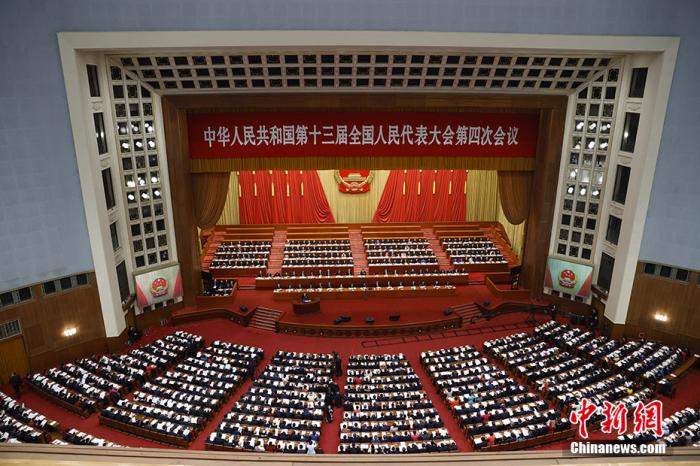(Observation of the NPC and CPPCC) How can the revision of this law make the congress more "see"?
China News Service, Beijing, March 7 (Li Jingze and Liang Xiaohui) Right now, the draft amendments to the rules of procedure of the 13th National People's Congress are being submitted for deliberation at the Fourth Session of the 13th National People's Congress.
Some of these new changes make the meeting more "seeing".
For example, the amendment clearly further expands the public issues of the meeting and enhances the public's understanding of the process of exercising power by the highest state authority.
To this end, the draft amendment adds provisions: the conference has a spokesperson, and delegations can set up a spokesperson as needed; the conference secretariat can organize representatives and heads of relevant departments and units to accept news media interviews; the conference plenary meetings can be conducted through radio, television, and the Internet Wait for a public report...
Data map: On March 5, the Fourth Session of the Thirteenth National People's Congress opened in the Great Hall of the People in Beijing.
Photo by China News Agency reporter Du Yang
This amendment intends to solidify and upgrade the effective experience of the National People's Congress in information disclosure for more than 30 years after the enactment and implementation of the law.
The rules of procedure of the National People's Congress were formulated in 1989.
Although China did not yet have such a rich media form at that time, it had already made clear about the publicity of the conference: press conferences and press conferences were held at the National People's Congress.
Based on this, the National People's Congress has continuously enriched the forms of information disclosure and enhanced its own transparency in accordance with the development of the times and media.
For example, "Ministerial Channel".
The 200-meter-long only way for ministers to participate in the conference was once the focus of media reporters, and it became an officially recognized communication mechanism in 2015.
Here, the staff will take the initiative to communicate with the ministers and invite them to respond to hot topics in front of the speaking stage, which will not only quench the thirst of reporters, but also refresh the public.
Another example is "Representative Channel".
Since its establishment in 2018, it has invited nearly a hundred deputies to the National People's Congress to talk about "the deputies of the National People's Congress" through their own experiences.
The people in the country have a better understanding of the responsibilities of deputies to the National People's Congress, and those overseas who are not familiar with China have an additional window to understand the Chinese system.
There is also a news center.
This window for the release of authoritative information, in addition to making it convenient for Chinese and foreign reporters to sign up for interviews, also publishes the meeting agenda, schedule, conference documents and other information in a timely manner, becoming another "information channel" for the National People's Congress.
In addition to the press conference held by the conference, the open day of each delegation...In the past few decades, more and more settings have been continuously increasing the information output of the two sessions of the country, and also providing more room for the media to play.
Even with the impact of the new crown pneumonia epidemic, the 2020 National People's Congress will shorten the duration and streamline the process, but the intensity of information disclosure will not decrease.
The ministers and representatives in the Great Hall of the People had a dialogue with the media reporters in the Media Conference Center. They were then broadcast live to the public through the Internet and TV. The interaction between the conference hall and the public opinion field continued to be frequently staged, achieving a special "two sessions" time. "...
Many of these beneficial experiences explored after the establishment of the rules of procedure of the National People's Congress in 1989 have been written into the draft amendment, which is expected to be further clarified in legal form.
This means that the public will gain insights into the National People's Congress and observe national development through more legal channels and forms.
This process will also enhance the people's sense of participation in the country's political life.
Making the National People's Congress more "see" in the eyes of the people is also becoming its due meaning in the modernization of national governance.
(Finish)

